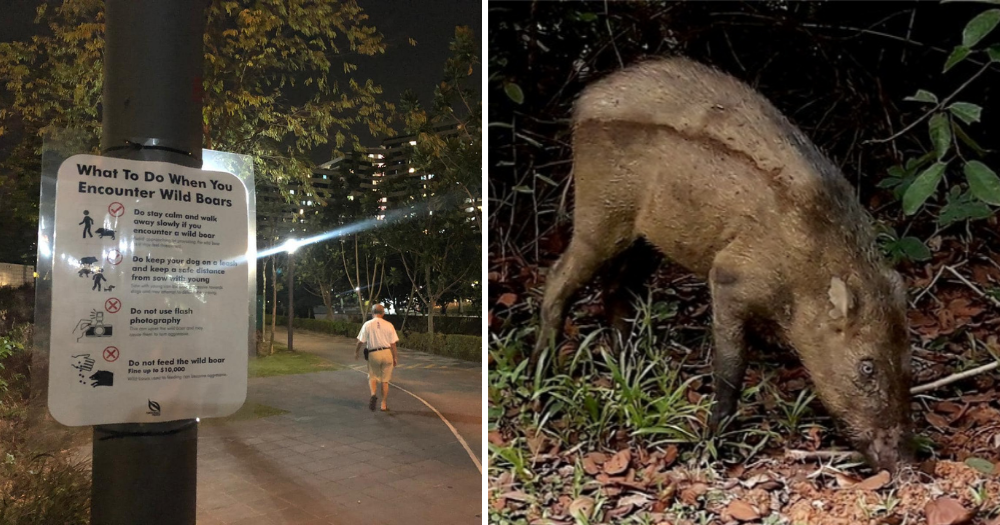The search continues for a wild boar that injured two people at Punggol on Feb. 20 night.
Search for boar continues
In a statement to Mothership, Director of Wildlife Management and Outreach at the National Parks Board (NParks), How Choon Beng, shared that the agency was first alerted to the incidents on Saturday evening.
A team comprising 20 NParks officers and contractors were activated to patrol the area and search for the wild boar.
This is to prevent further human-wildlife conflict, How said.
Although the search continued throughout the weekend, there were no sightings of the wild boar in the area.
Mothership understands that the wild boar involved in the attacks is a lone female boar that weighs around 40kg to 50kg.
Based on a profile description put together during NParks' investigations, the patrol team will be able to identify the specific boar during their search.
Meanwhile, How said that NParks will continue patrolling the area.
In an update on Feb. 22, Member of Parliament for Punggol West SMC Sun Xueling said that the team will be out patrolling till 3am.
Signs advising people on what to do should they encounter a wild boar have also been put up.
Due to the boar's tendency to stray into publicly accessible areas in search of food, and the potential threat that it poses to public safety, the boar will be trapped and subsequently removed from the area.
What happened
Two women were attacked by a wild boar in two separate incidents on the same night on Feb. 20.
The attacks happened within 20 minutes of each other in the vicinity of Punggol Walk.
The first woman was attacked at around 9:10pm at 308B Punggol Walk.
The second woman was bitten by the boar and apparently dragged along for about 1m, at around 9:30pm at 310A Punggol Walk.
Both women were conveyed to Sengkang General Hospital.
Managing the local wild boar population
To better understand the distribution of Singapore's wild boars, NParks carries out population surveys and research studies.
These help the agency monitor the changes in the boar populations, as well as analyse habitat and landscape factors that affect wild boar occupancy.
It also helps to identify areas where incidences of human-wild boar conflicts might occur, which enables NParks to implement mitigation and management measures.
Management options include implementation of animal conflict mitigation measures, habitat modification (e.g. removal and replacement of oil palms with native plant species), outreach and engagement programmes to educate the public not to feed wildlife.
Feeding wild boars changes their behaviour
However, illegal feeding of wild boars poses a threat to the animals.
Boars grow accustomed to human presence may become a safety hazard to the public, and would then need to be relocated or culled humanely.
Feeding, or even improper disposal of food, changes wild boars' natural foraging behaviour.
As they become more used to humans, they may start relying on humans as a convenient source of food.
Not only will the boars then increasingly approach humans for food and venture into urban areas, they might wander onto roads and pose a danger to motorists and themselves.
How said: "If wildlife turn aggressive due to constant feeding, they may have to be put down to safeguard public safety."
NParks also reminded the public that they should remain as calm as possible when encountering a wild boar, and move slowly away from the animal.
One should keep a safe distance and not corner or provoke the animal.
If adult wild boars are seen with young piglets, one should keep a distance and leave them alone, as they are potentially aggressive and may attempt to defend their young.
Members of the public may call the Animal Response Centre at 1800-476-1600 to report any wild boar encounters.
Top photo from Sun Xueling / FB and Jnzl / Flickr (picture of wild boar for illustrative purposes)
If you like what you read, follow us on Facebook, Instagram, Twitter and Telegram to get the latest updates.

